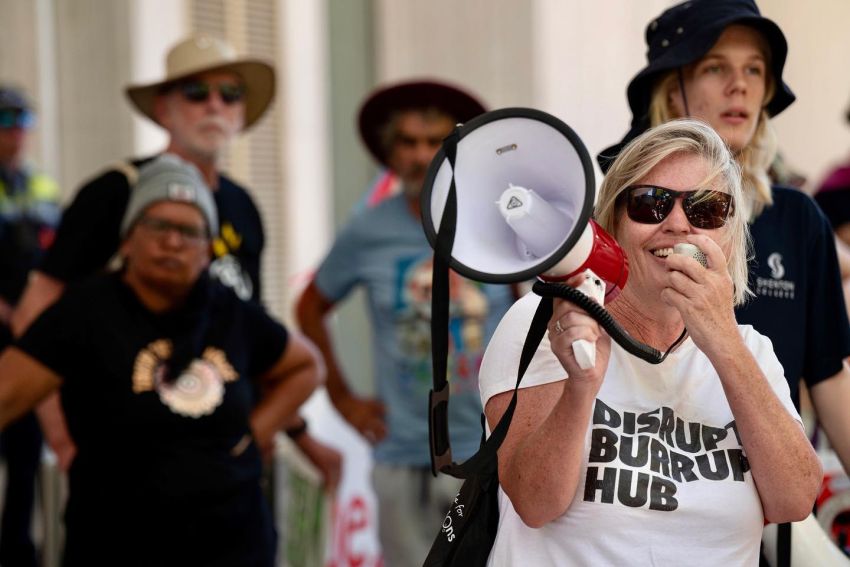
Petrina Harley, a Disrupt Burrup Hub and Socialist Alliance activist who blocked access to Woodside’s industrial plant in Western Australia’s Burrup Hub peninsula on July 12 last year faced court on June 16.
Harley asked the court to consider her actions under the “sudden or extraordinary” climate emergency defence, telling Green Left that her action was a reasonable response to “Woodside putting lives at risk”.
“Woodside’s emissions from Burrup Hub in the north west of Western Australia directly adds to the rise in global temperature that is causing catastrophic climate events and mass deaths.” She said WA Labor is not only “doing nothing” to stop it, “worse, it is subsidising Woodside’s pollution”.
Many judges dismiss the climate emergency defence as a political stunt. They can decide a person undertook a reasonable response to an emergency, but in Harley’s case, the court did not.
“I did not deny the charges. The burden of proof was on the prosecution to prove, beyond a reasonable doubt, that a climate emergency did not exist and that my action was therefore reasonable,” Harley said.
This was the second time Harley had used this defence. “I blocked the same road [into the Burrup] in 2021, but no lawyer was willing to argue this way. I represented myself and the judge dismissed the argument.
“When the opportunity to block the road came again, I agreed if the lawyer representing me believed that non-violent direct action is a legitimate form of protest.”
Zarah Burgess represented Harley.
“When the police prosecutor complained that this was a political stunt and a waste of court time, Burgess tore him to shreds.”
Harley spoke about the climate emergency and why her actions were a reasonable response on the first day of the trial. She said only after having had children and realising that corporate greed driving the climate emergency did she become an activist.
“I learnt about Woodside’s Burrup Hub project in 2018 after attending a 350.org Australia lecture. The extent of Woodside’s industrialisation in the Burrup was horrifying. I joined regular information stalls to let people know what Woodside and the WA government were planning.
“This part of the testimony showed I had a reasonable belief in the climate emergency.”
In response to Burgess’ questions about why her actions were the “only reasonable response” to the climate emergency, Harley replied that history showed civil disobedience is a most effective way to achieve change.
“My testimony tried to underscore that activists include teachers, students, doctors, scientists, lawyers, parents and grandparents,” Harley said.
The police prosecutor focussed on the protest planning, implying that because we had time to do that, it could not be deemed a “sudden emergency”. They also argued that blocking the road was not a “reasonable response” because we didn’t achieve our goal.
However, Woodside’s operations last July were stopped for more than half a day.
Peter Newman, Professor of Sustainability at Curtin University, talked up the science between fossil fuel emissions and global warming on the second day the trial.
Newman, a lead author for the United Nation’s Intergovernmental Panel on Climate Change (IPCC) on transport, said 30,000 IPCC scientists are convinced that the only way to reduce emissions is to stop the mining of fossil fuels.
He said Woodside’s expansion of the North West Shelf would release 4.3 billion tonnes of toxic emissions over the next 50 years, and calculated one of the costs would be 120 lives lost each day.
The prosecutor did not attempt to refute the science, instead questioned Newman’s credibility as a scientist because he had met Harley at a Disrupt Burrup Hub meeting.
The judge found Harley guilty of three obstruction charges and fined $3000 on July 10. They said although the defence had proved Harley’s belief in the emergency to be genuine, it was not convinced that the emergency could be considered “sudden” or “extraordinary”.
The judge pointed to Newman’s statement that Woodside still had time to turn things around “if they did so by 2030”, saying it gave weight to the prosecution argument that this was not an emergency.
She said the prosecution was correct to argue that the blockade was “not a reasonable response” because it did not achieve its stated goal of stopping operations.
She cited three similar cases that had failed to win acquittals. “It sounded like she was apologetically trying to say, ‘Look, I’d acquit you if I could, but how can I find you not guilty when other magistrates have said this’,” Harley said.
Harley received a smaller fine compared to other DBH activists. Some have been fined $10,000 each for being caught with stink bombs ahead of a Woodside annual general meeting.
“Only a very brave magistrate would have agreed with my defence, as it would set a precedent for similar cases,” Harley said. “But I see my action, and subsequent trial, as one more incremental step in the overall struggle. Woodside is currently facing two separate court cases over its destruction of Murujuga petroglyphs. The struggle is far from over!”